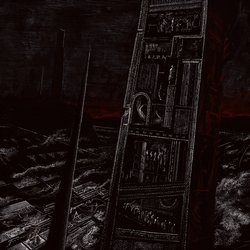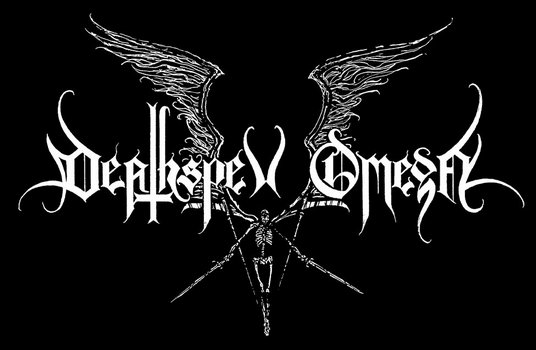Deathspell Omega – The Furnaces of Palingenesia & Misþyrming – Algleymi: The Fiery Birth of Summer (Norma Evangelium Diaboli)
Memorial Day weekend is frequently seen as the start of summer here in the States: retailers bank on it and your neighborhood military members frequently endure half a day of safety briefs before being loosed on their four day weekends. Pools open, most kids are free from school, and the tyranny of dense humidity is already par the course.
There were several fantastic black metal releases on May 24 but two in particular that we’re concerned about here: Misþyrming’s long-awaited sophomore release Algleymi (Oblivion) and Deathspell Omega’s quiet emergence from the void with The Furnaces of Palingenesia. One album another entry in an multi-year streak of stellar releases from the small but absolutely spectacular Icelandic scene and the other one of the most revered (and forward-leaning) bands in the black metal world (and for yours truly, a long-term love). None of the old world terms of the genre apply here: both of these albums radiate with fire.
Misþyrming’s 2015 debut Söngvar Elds Og Óreiðu (the only time I’m typing that) was a stellar, varied surprise of a release, seething with the energy that exists in youth and the twilight years before death.
Fortunately, Algleymi is all energy: a crackling, vivid, primal energy. And focused.
High profile festival appearances have been the band’s occupation in the years since the debut and Algleymi is brimming with a rock-like focus, even in its more subdued moments. The band also shows a clear debt to Mgła with its drive and careening wash of melodies. And melodies. And more melodies. The melodic focus throughout Algleymi cannot be overstated, one torrent after another, a tremolo tornado spinning endlessly.
So what of The Furnaces of Palingenesia? I was on a trip to Oregon when an unrelated label (the ever spectacular 20 Buck Spin) dropped the news to me that a new album was imminent from the band. The Synarchy of Molten Bones was a perplexing release for many, both in its size (at 29 minutes, shorter than a couple EPs by the band) and its utterly unrelenting nature. Within the greater narrative perhaps it made sense thematically. Drought was the curtain call on the ‘trilogy’ experience and ended on something of a whisper. The raw chaos that existed beyond that close was fitting, if not exactly easy to swallow or making for a compelling listening experience (though it has its moments).
Recorded live and mixed on analog gear at Kerwax Analog Recording Studio, 2018.
The words to be found in my initial search for information on the pending release and a fascinating bit of exposition considering the otherwise silent nature of the band: it meant unquestionably a real drummer. But what would the album sound like? For a band that has never played live, what would it actually to record an album live? The answer is, in the end, unsurprising.
It sounds exactly like Deathspell Omega.
The sort of dedication to craft and playing that built the band’s legacy (sonically, anyway) shines through. Melody, dissonance, long-winded and a novella-worth of lyrical content make for an incredibly dense, and familiar, listen. Sound-wise The Furnaces of Palingenesia shares much more in common with Paracletus than any other release and thematically, though new elements do come into play.
Paracletus is a pillar album when considering Algleymi (or Sinmara’s stellar Hvísl Stjjarnanna): it really seems to have laid the thematic and conceptual groundwork that the Icelandic scene as a whole has taken and ran with, creating to phenomenal effect. The use of dissonance, of melody, of artistic weight given to things beyond religious caricature or mundane themes. So it is particularly pleasing to find Deathspell Omega and a protégé like Misþyrming release similarly stellar albums in parallel.
The aforementioned energy across Algleymi is apparent from the opening of the gate with “Orgia”, no time wasted in going for the listener’s ear (and throat). And pulses with an alarmingly easy grace across wave after wave of directly, not variable in the progressive sense but in a variety of pace and focus across its body, slowing only to seethe; opening to allow the guitars to absolutely soar. “Alsæla” (“Ecstasy”) is unquestionably my highlight, it’s here the rock’n’roll (without getting into black’n’roll) energy is at its most overflowing, it’s legitimately infectious.
A similar but differently focused energy pulses throughout The Furnaces of Palingenesia. While 11 tracks make up its breadth there is a thematic continuity throughout and while there is the occasional break, it does generally flow as a single piece. The ‘single’ that came with the album’s announcement, “Ad Arma! Ad Arma!” was an interesting choice, if for no other reason than its pace: decidedly funeral in comparison to the tempos experienced on Synarchy. It played well with the live recording piece but left a number of swirling questions with what to expect with the album as a whole, was everything going to be at a similar pace?
In short, no.
The track makes considerably more sense where it is in the sequence of the album than it does solo (to say nothing of its gorgeous video), and its part of a tangible ebb and flow that exists across the album’s length. The cadence born of familiar dissonant, rhythmically jagged moments melting into the melodic (and frequently despairing) digressions make for a listen that is dense but consistently rewarding.
Bass is a peculiar instrument within the band historically, serving a sonic and structural role mirroring Type O Negative far more than contemporaries within black metal and that remains the case here. “1523” , a downtempo midpoint in the pendulum-swing of the album’s momentum, is made possible by the cavernous (and synth-like) tone the bass provides. Those savage blastbeats long thought to be the work of well-done drum machines are present throughout (“Renegade Ashes” “The Fires of Frustration”): here acknowledged (kinda, I suppose) to be the work of a human keeping up ably to the nimble, frequently shifting guitar. A guitar sound that doesn’t require elaboration- it’s been well-established for a long while.
Thematically if Synarchy was the winter that follows some great cataclysm, Furnaces is a rebuilding on the other side. All that was old is new again: humanity historically is not an entity prone to change and the drive toward fascism, conformity, and the will of the mob are core ideas at play. Whether part of some grand narrative or a narrative playing the political climate running loose across many parts of the world, the literary themes are dense. Nostalgia, identity (or lack thereof), and the role of man in congress with the divine continue to place the band on an intellectual few others can attempt to match.
May 24, now notable for two phenomenal reasons beyond my sibling’s birthday.


9.5/10
9.5/10


